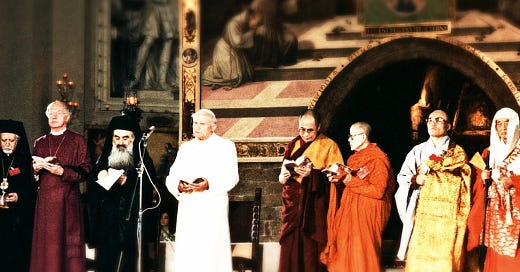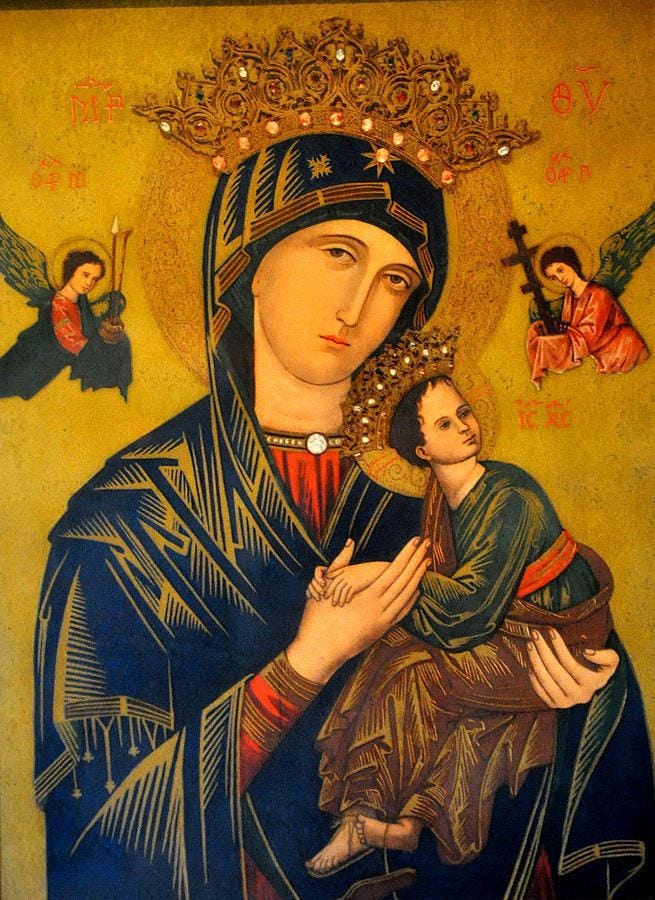“Who are you to say that your religion has it all figured out?!” Yes, I actually heard this question from someone who professes themselves to be Catholic. Sadly, this way of thinking is quite common amongst the laity today. We find ourselves trapped in a strange era where error and heresy seem to be commonplace in the Church. Yet, for most, this is just business as usual and normal in the time of “dialogue” and “bridge building.”. Truly we must ask: where have we come as a church when so much of the laity refuses to accept the deposit of the faith and instead embrace a radical individualism devoid of anything but philosophical agnosticism? As faithful Catholics, we cannot continue to sit by while fellow Catholics fall deeper into the pits of heresy and error. We must do our due diligence and provide correction enthusiastically and with charity.
Extra Ecclesiam Nulla Salus
There is but one universal Church of the faithful, outside which no one at all is saved.
- Pope Innocent III, Fourth Lateran Council, 1215
Outside the Church there is no salvation. Admittingly, there have been times when I struggled with this teaching from the Church. It is not pleasant to think that many of your loved ones, friends, and many that you encounter will not achieve the beatific vision. Christ tells us himself that, tragically, few will take the path towards salvation (Matthew 7:13-14). This is why it is so urgent that we as faithful churchmen do our duty to spread the gospel and do our best to convert those around us towards the true faith. For those outside the Church, there are severe doubts regarding their state of salvation. Of course, there are the extraordinary cases of baptism by desire and by blood as well as invincible ignorance, but this is not an excuse to ignore the commands given by Christ to bring those his word and into his Church (Mark 16:15-16). While I will not be presumptuous in passing judgement on an individual’s future state with certitude, as that is not my station but the Father’s alone, I will and can state with certainty, and with the full faith of the Church, that faiths outside of Catholicism are not salvific. If a non-Catholic is able to attain the beatific vision following their judgement, it is in spite of the heretical, schismatic, or non-Christian faith or lack thereof they subscribe to, not because of it.
Disordered Ecumenical and Interreligious Dialogue Today
Ecumenism is all the rage today with the ethos of our time: diversity, equity, and inclusion. The culture espouses the nonexistent virtue of tolerance to the detriment of objectivity, faith, and oftentimes reason. When ordered properly, ecumenism can be a tool in which the Church is able to convert the masses of those finding themselves in heretical or schismatic faiths, while interreligious dialogue can be a means to convert the non-believers. Conversion is key here as there is no other end goal with such actions other than to bring them into the one, true Church. (Mortalium Animos, Blessed Pius IX). Sadly, the post-modern world has embraced the notion that “God wills the existence of a diversity of religions” and many Catholics (including sadly the late Pope Francis) agree with this. A recent pew research study from 2021 on the nature of the afterlife confirmed this among American Catholics in particular, with some scathing and scandalous beliefs held by those professing to be members. According to this survey, 72% of Catholics surveyed held the belief that many religions can lead to Heaven, while only 16% said that Catholicism is the one true faith leading to Heaven (Views on the Afterlife, Pew Research). This is just one piece of evidence in the myriad that points to a crisis of faith in the Church today.
Correcting the Error
How should Catholic address religious indifferentism as part of the overall crisis of the Church? Firstly, we must always look towards prayer and fasting (Psalms 34:13). No crisis ever in the history of the Church was ever corrected purely through material means and we as Catholics must always look to the way of the cross for guidance on these matters. Practice fasting outside of the normal Lenten period and subscribe to the traditional practices held prior to Vatican II. If your parish does not have rosary before every Sunday mass, take the lead and start praying the rosary aloud. If your parish does not have a bible study group, discuss the matter with your parish priest. Be diligent and be bold. This goes double for those in Novus Ordo parishes as they are almost exclusively where the vast majority of problems in the Church today reside. Find other traditional Catholics in your area. Catechize yourself and ensure you are well-informed on matters of the faith for you never know when you may need to witness to non-Catholics or very misguided fellow Catholics. I can speak to this myself as I engaged in several conversations and debates with a Protestant colleague of mine over the course of months only to find out later that these were instrumental in leading him to recognize the truth of the Catholic faith. Grace works in mysterious ways. We must stay hopeful and have faith that the crisis will, in time, come to an end.
Our Mother of Perpetual Help, Pray for Us!




This is certainly an awkward agreement. As someone who is not part of the Church of Rome, I actually whole-heartedly agree with your call toward exclusivism, even if it may condemn me. I recently was reading a post from an ex-evangelical who was “educating people on cult-like practices.” One of the common behaviors mentioned was if “Your religious group expressed certainty that their beliefs were “the truth” while all others were wrong.” It’s sad to see that this really is where we have arrived, that belief itself can be labeled #religioustrauma or #spiritualabuse (Yes, these really were the tags they chose to use.) When I was a young teenager, my mother once asked me, “you always think you’re right, don’t you?” Doesn’t everybody? Apparently, not anymore. As Christians, we need not be ashamed that we have confidence in the truth of the Gospel. Neither should we back down when people challenge us with emotionally charged questions. The path is narrow; not many will enter. This of course is where our thoughts divide. I do believe that there is salvation outside the Church of Rome (and within it, to be clear.) But I applaud your call to prayer, fasting and catechization. These are tenets that will lead the church into unity, and out of the chaos of the 21st century. Stand firm in your Roman Catholicity. Continue to convert both unbelievers and protestants alike. To do anything otherwise would devalue your faith, and diminish your message. Thank you for the delightful read! God bless!
Just read your post and found a confusing few sentences that seem to contradict your preceding words. I mean the part where you say (and I paraphrase) that if non-catholics achieve salvation it will be despite their false religion not because of it. That would mean there actually can be salvation outside the Church if some non-Catholics actually do be saved despite their not being Catholic and despite the dogmatic statement you quoted which asserts the contrary. Might this caveat be a contributory factor in stifling one’s zeal somewhat and diminishing the sense of urgency we ought to have in bringing as many souls as possible to the one true Faith? Would it not be better to take that dogmatic statement as it is writen (which makes no such allowances) and not concern ourselves with speculation on matters beyond our knowledge? As for invincible ignorance, where has it ever been taught that ignorance can be salvivic? Hosea 4: 6 tells us, “My people perish for lack of knowledge.” Either one can find salvation outside the Church or one cannot. The thrice defined dogma states one cannot so who do we follow?
This may have come off somewhat over critical but despite my unsolicted critique I found it commendable. I’m very aware that human nature being what it is sees the door everso slightly ajar anf nothing will do until it’s pushed all the way open. See where this kind of speculation leads when we here a “pope” say that God wills all relgions and all of them lead to God (except maybe Teaditional Catholicism).